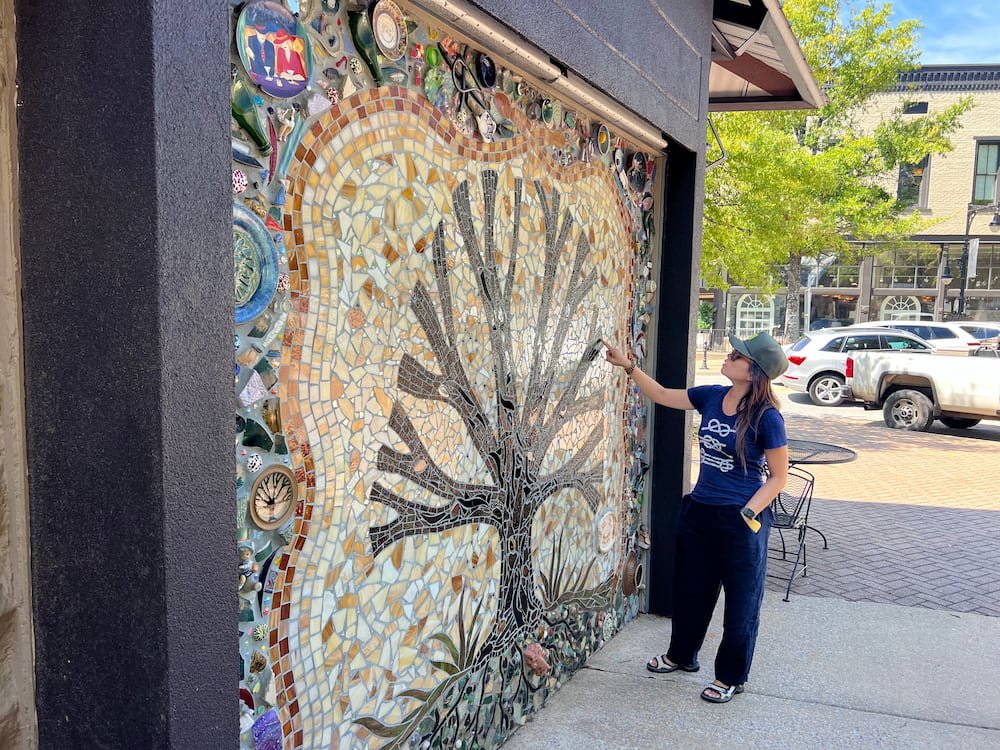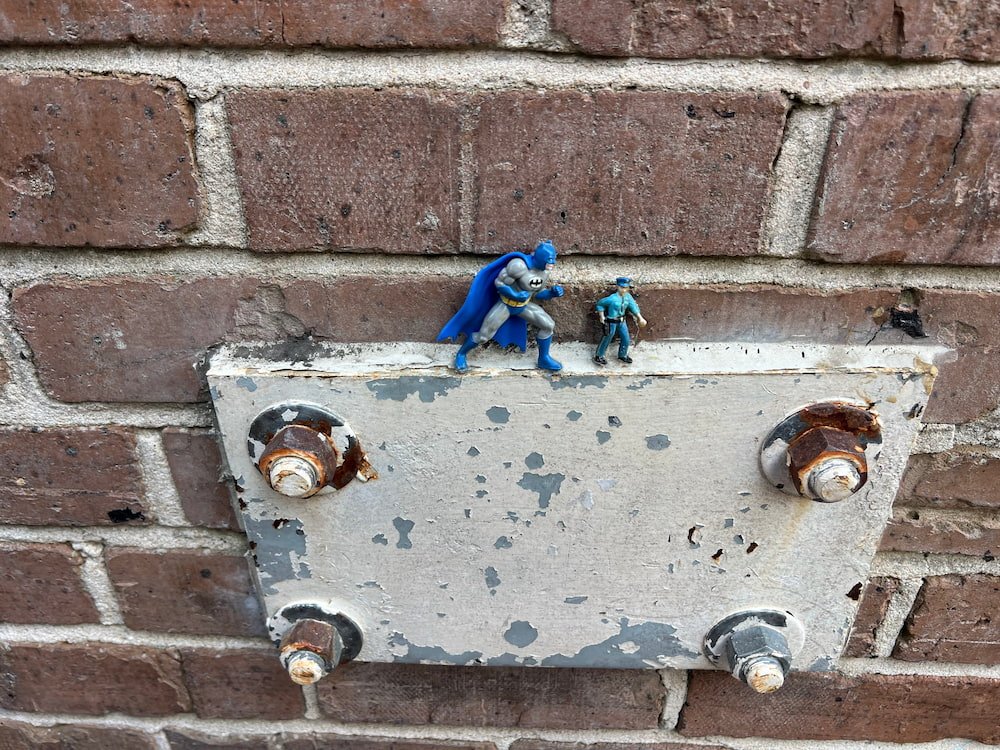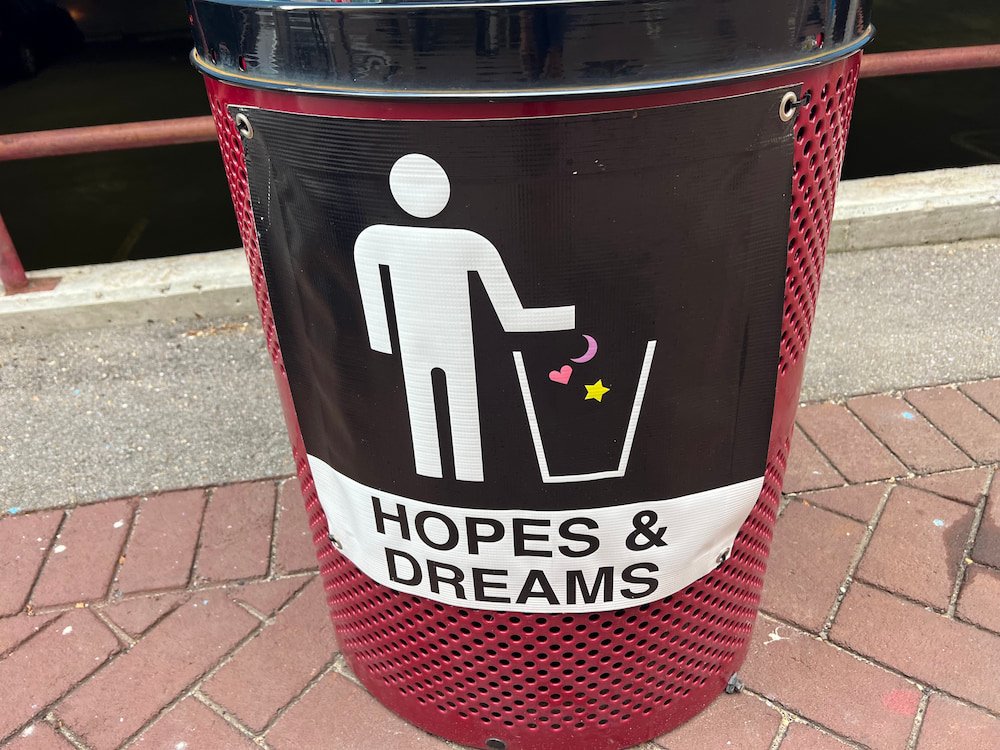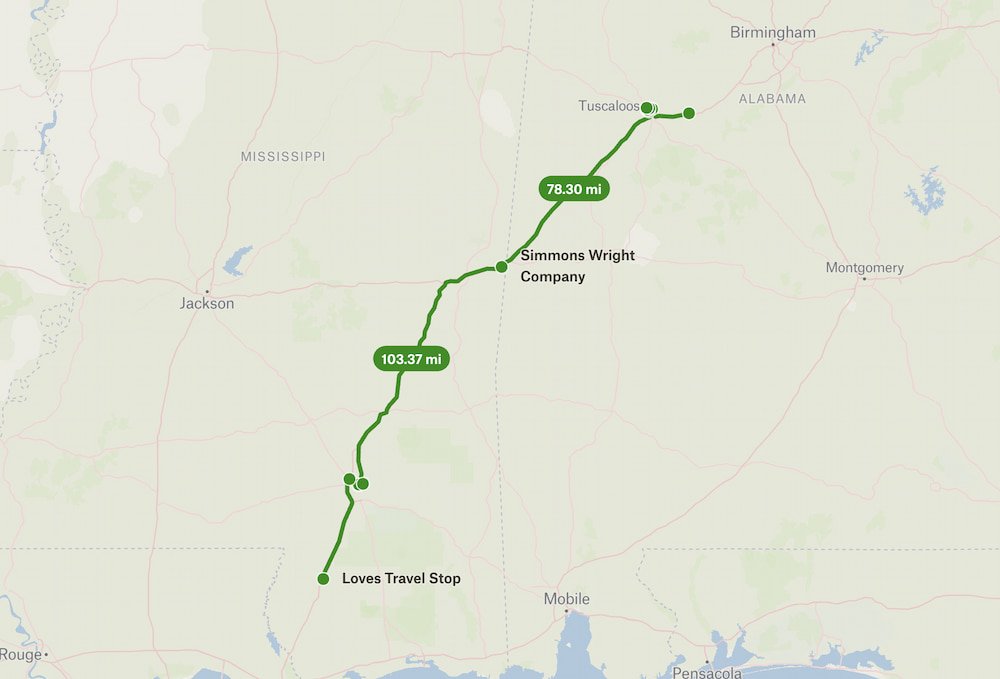We'd slept near the city of Tuscaloosa in Alabama overnight, in the west of the state. Tuscaloosa is also home to the University of Alabama, which had a couple of quirky attractions, including "Goldie 1971", a giant rusting robot lying on the ground, created by a former student as an ode to Alabama's iron heritage.
The area surrounding the university is clean and charming--like many other university towns we've been to, it's filled with shops, restaurants, and cafes. But school was clearly now in session, with students walking all over the neighborhood and campus to get to and from classes. Unfortunately, this meant that we quickly realized that there was absolutely nowhere to park, and we were, for a while, stuck on the campus grounds thanks to a never-ending line of students walking around. We had to push through at the first small gap in foot traffic to leave, otherwise we would still probably have been at a standstill!
Unfortunately the Tuscaloosa River Market, a year-round farmer's market, was closed when we were there (the markets are on every Saturday), although there's a lovely path alongside it and the Black Warrior River, where a few people were going for a brisk walk or jog, which also continues on to the Tuscaloosa Amphitheater, a live music venue.



On the other side of the river are more cute shops and restaurants, as well as the Kentuck Art Center & Festival, a place that offers art programs to the community, and supports local artists. There's a big red dog at the top of the building with the gallery, some funky art installations outside, and another building where we could see a few artists hard at work, next to what looked like an outdoor kiln.


Not far from this is Capitol Park, another pretty and peaceful park to walk around in that also has a old and fascinating bridge running across it. It's lovely that there are so many green areas around the city! There are quite a few glimpses of history in Tuscaloosa, including the Jemison-Van de Graaff Mansion, historic Italianate-style mansion built between 1859-1862 by Alabama State Senator Robert Jemison. It has 26 rooms, and is distinguished by its octagonal cupola and delicate carved fretwork. To tour the mansion an appointment is needed, and it was acquired as a library in the 1950s, although today it seems to be where a number of offices are now located, based on the sign outside the mansion with the names of multiple companies.

Next Stop, Mississippi!
We had a decent drive after this, crossing the border into Mississippi, state #31! Woohoo! We felt that we were really now in the Deep South of the US, driving through sparsely populated towns with country stores (not much in the way of big chain stores out here), flat and marshy land, and dense forests. The weather was hot and incredibly humid, characteristic of the south (we're sure it gets cold here in winter, but when we think about this region, it's always been on hot and humid times of the year)Our first stop was The Simmons-Wright Company , a country store that's been around since 1884! There's no other stores around it--it's literally in what feels like the middle of nowhere, as it's just surrounded by open fields.



Walking into the store is like stepping back in time--it's 2 stories and is dimly lit inside, and the kind of store where you can buy sorghum molasses and sweet pickles in one aisle, iron-cast pans in the next, and fertilizer in the third aisle. There was a guest book as we entered to sign into, and we heard a voice greet us from the middle of the store (we were the only customers). It turned out it was Gary Pickett, whose family has had the store from the beginning. He inherited the store from his aunt, who ran the store until she was in her 90s. He used to work in the logging industry, but has now taken over the store, and over the years has also added a cafe, making breakfast and lunch for customers 6 days a week.
We chatted to Gary for quite a bit (he seemed eager to chat, and we liked hearing his strong southern drawl), and he mentioned that he'd like his children to take over the store after him, but they don't live in Mississippi anymore and he's concerned that they would simply have other folks run the store instead. There's a positive nostalgia that these places continue to exist, and we hope that they survive and thrive for many more years, rather that the world being completely engulfed in big box retail stores and online stores like Amazon.
Hattiesburg Highlights
Driving further south for an hour and a half, we reached Hattiesburg, the 5th-largest city in Mississippi, that is steeped in history. The Hattiesburg Train Station is a relic in time--there's an old locomotive at the front that's over 100 years old, adding to this vibe. The station is not enclosed (passengers stand on the platform outside), and the train station itself is designed in an Italian Renaissance style, with a vintage, clay-tile roof and waiting room inside. Located in the oldest historic district, the station is apparently a popular place to hold events (we saw a couple taking professional photos while there).


We've seen quite a few outdoor art alleys on this trip, in cities from Phoenix, Detroit, and Boise. But what surprised us was that our absolute favorite art alley would be in Hattiesburg, making this stop alone well worth our visit to the city! The Hattiesburg Pocket Museum is in an alley next to the Saenger Theater, a movie theater built in 1929 in the typical neoclassical & art deco-architecture of that era, that still operates today.





The Pocket Museum is filled with miniature sculptures and various little exhibits, and we wanted to take a photo of pretty much all of them, because they were adorable, funny, and unique! Upon entering the alley there's a place to add your own painted rock. Walking past another exhibit there's a spot to apparently dance, and when you walk past it, it triggers a sensor to start playing music, with shining lights to encourage you to dance underneath it. There's a little cupboard to trade rubber ducks and pins, as well as keychains (we dropped off the lanyards we received in Cincinnati from Graeter's Ice Cream here).


There's clearly a love for rubber ducks in this alley, as there's a little window that plays Ernie's "Rubber Duckie" song on loop, with a video of his singing it on Sesame Street. There's cartoon Minions also painted onto posts, and a little rainbow bridge that made us teary, as numerous dog collars and leashes were hung over it for pets who are no longer with us (they've "crossed the bridge", so to speak). The alley is also pet friendly, and it's incredibly fun to look at every single exhibit. There's even an opportunity to go on a scavenger hunt down the alley, with a list provided of things to try and find as you wander along.
Hattiesburg is known for its role in the US Civil Rights movement, particularly during the Freedom Summer of 1964, when it hosted the largest number of volunteers for a voter registration project. We didn't do the whole tour (seeing a few stops as we drove along), but there's a driving and audio tour around the city, to see the 16 historic landmarks that played a key role during Freedom Summer (the link shows all the landmarks, and you can listen or read about each of the stops online).

We left Hattiesburg in the early evening, stopping at a Love's Travel Stop overnight in the small town of Poplarville, Mississippi. Tomorrow, we'll be heading into Louisiana again (we were in this state earlier to visit places like the Creole Nature Trail and Baton Rouge) to explore New Orleans!

Route Map

